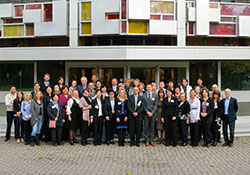Capacity to diagnose M/XDR-TB strengthened across Europe

RIVM/Jan van Galen
WHO/Europe has established the European Tuberculosis Laboratory Initiative (ELI) to increase laboratory capacity to diagnose multidrug- and extensively drug-resistant tuberculosis (M/XDR-TB) across WHO European Region, as part of a consolidated action plan for 2011–2015.
ELI members met for the first time on 15–16 October 2012, in Bilthoven, the Netherlands, at an event hosted by the Netherlands National Institute for Public Health and the Environment (RIVM), under the partnership agreement between WHO and the Netherlands Ministry of Health, Welfare and Sport.
Representatives from 21 countries in the Region, mainly those where TB is a high priority, discussed issues including quality control, biosafety, and the implementation and scale-up of rapid diagnosis of M/XDR. The participants also included representatives of WHO’s Global laboratory Initiative (GLI), the Foundation for Innovative New Diagnostics (FIND) and the European Reference Laboratory Network for TB.
ELI will facilitate the adaptation and implementation of global laboratory guidance in the Region, with particular attention to the countries where TB is a high priority, which have the highest level of MDR-TB in the world.
The WHO European Region includes 15 out of the 27 countries in the world with a high burden of MDR-TB.



